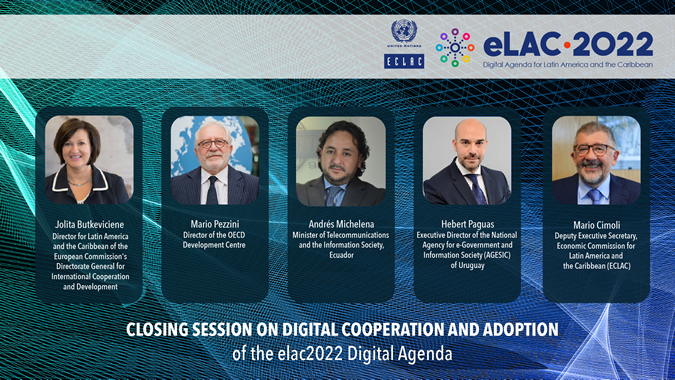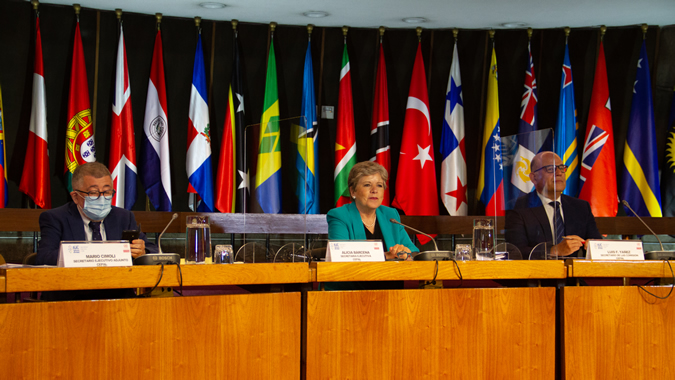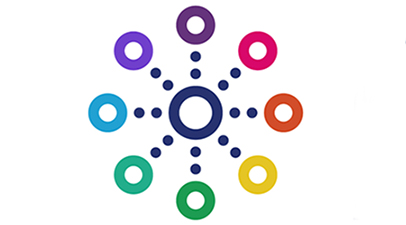Countries of Latin America and the Caribbean Approved the eLAC2022 Digital Agenda
Work area(s)
Today the VII Ministerial Conference on the Information Society in Latin America and the Caribbean, organized virtually by ECLAC and the Government of Ecuador, came to a close.

Countries from the region participating in the Seventh Ministerial Conference on the Information Society in Latin America and the Caribbean approved today the Digital Agenda for Latin America and the Caribbean (eLAC2022), which includes 8 areas of action – along with a specific section on the fight against the pandemic and economic recovery – and identifies 39 specific goals for its implementation over the next two years.
The eLAC2022Agenda is intended as a catalyst for regional cooperation on digital matters and a mechanism to promote policy design, capacity-building and political dialogue on the challenges and opportunities that the digital transformation creates for society and the economy.
The eight areas of action are: digital infrastructure; digital transformation and the digital economy; digital government; inclusion and digital skills and other competencies; emerging technologies for sustainable development; trust and digital security; the regional digital market; and digital regional cooperation.
Among other things, the participating countries agreed to foster a regional digital market strategy that facilitates cross-border e-commerce and digital trade through integration of digital infrastructure, regulatory harmonization, free flow of data with trust, in accordance with domestic legislation; trade facilitation; improved postal and logistics services; and regulatory frameworks that encourage innovation in digital payment services.
With regard to the response to the pandemic, the eLAC2022Agenda calls for designing strategies for economic recovery and reactivation based on productive digital transformation and the harnessing of information and communications technologies (ICTs), and which encourage inclusive innovation and changes in management, production and business models, with special attention paid to Small and Medium-sized Enterprises (SMEs).
The Agenda also proposes “strengthening distance education programmes in national education systems” and “supporting the training and digital literacy of teachers and the development of digital educational content.”
Participating in the closing ceremony of the Ministerial Conference, organized by the Economic Commission for Latin America and the Caribbean (ECLAC) and the Government of Ecuador, were Mario Cimoli, ECLAC’s Deputy Executive Secretary; Jolita Butkeviciene, Director for Latin America and the Caribbean of the European Commission's Directorate General for International Cooperation and Development (DEVCO-EuropeAid); Mario Pezzini, Director of the OECD Development Centre; Andrés Michelena, Minister of Telecommunications and the Information Society of Ecuador; and Hebert Paguas, Executive Director of the National Agency for e-Government and Information Society (AGESIC) of Uruguay.
In his remarks – on behalf of Alicia Bárcena, ECLAC’s Executive Secretary – Mario Cimoli praised Ecuador’s proposal to create a regional fund for universalizing access to digital technologies and offered ECLAC’s backing as Technical Secretariat of the eLAC process.
The senior official flagged the need to make progress on data protection and cybersecurity, and he highlighted the role of digital technologies in the region’s economic, social, productive and industrial development. “Digital solutions must be the key to addressing Latin America and the Caribbean’s structural problems,” he stressed.
“At the meeting, the urgency of the eLAC2022 Agenda for achieving development with equality and environmental sustainability was underscored,” Jolita Butkeviciene noted during her remarks. “I am convinced that, in the quest for more inclusive societies, Latin America and the Caribbean has a natural partner in Europe. Digitalization and a digital partnership between both continents can become an effective weapon for forcing the high levels of inequity in our societies to drop.”, she added.
Mario Pezzini, of the OECD, sustained that “a new social compact is needed for a better post-pandemic rebuilding, and as part of that social compact there is a digital compact. We have to conceive of the digital transformation not only as a technological transformation, but also a political one.” He also agreed that “the digital transformation can play a key role in resolving the structural challenges of Latin America and the Caribbean.”
“Uruguay is going to organize the next Ministerial Conference on the Information Society in 2022. We support and we are committed to promoting the eLAC2022 Regional Agenda,” Hebert Paguas, of Uruguay’s AGESIC, indicated during the event’s closing session.
Finally, Andrés Michelena, Minister of Telecommunications and the Information Society of Ecuador, stressed that “an agenda of this magnitude necessitates commitment and political will at the highest level,” and he reiterated his country’s intention to work on the creation of a Latin American fund for universalizing access to digital technologies. “We need resources to make our eLAC2022 Digital Agenda a reality,” he insisted.
The Presiding Officers of the Ministerial Conference on the Information Society in Latin America and the Caribbean is composed of Ecuador as Chair, along with Argentina, Brazil, Chile, Costa Rica, the Dominican Republic, Mexico, Peru, Trinidad and Tobago, and Uruguay.
Related event
Related content

Countries in the Region Stressed the Urgency of Making Progress on Inclusion and Digital Transformation to Emerge from the Crisis and Achieve Development with Equality and Environmental Sustainability
The President of Ecuador, Lenín Moreno, and ECLAC’s Executive Secretary, Alicia Bárcena, led the inauguration of the VII Ministerial Conference on the Information Society in Latin America and the…
Subregional headquarter(s) and office(s)
Related link(s)
Country(ies)
- Latin America and the Caribbean
-
Ecuador
-
Uruguay
Related project(s)
Contact
Public Information Unit
- prensa@cepal.org
- (56 2) 2210 2040


